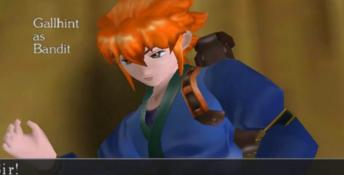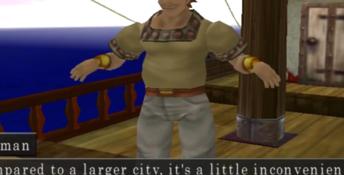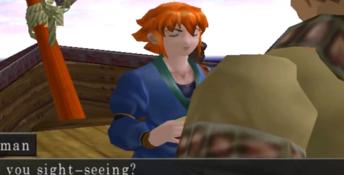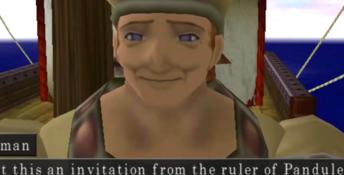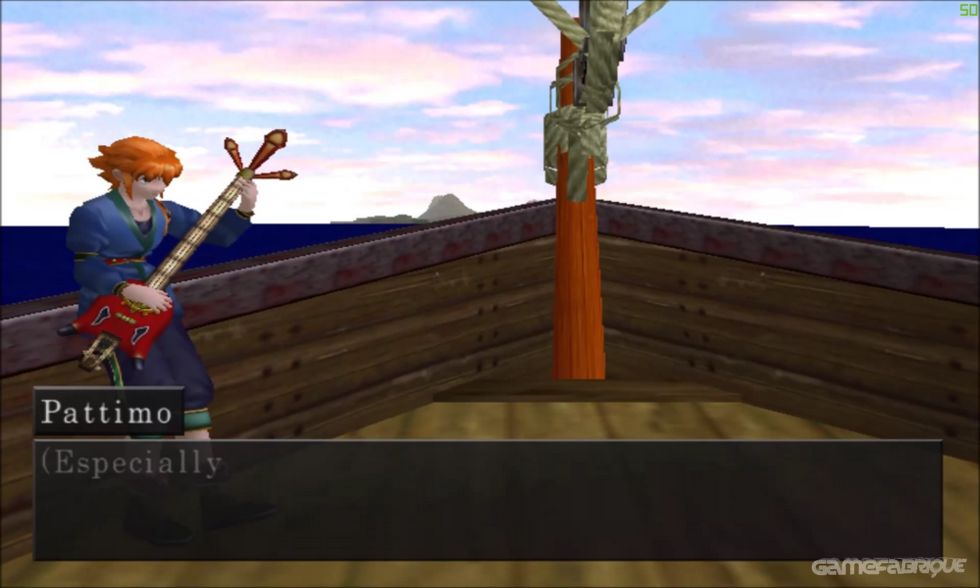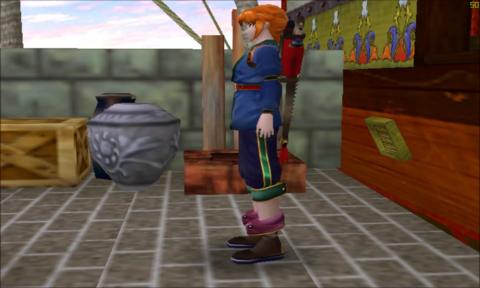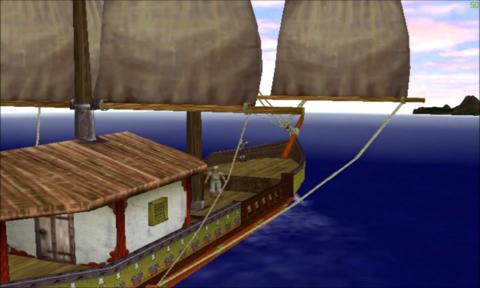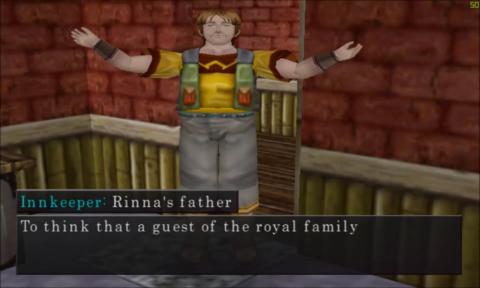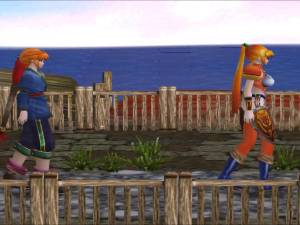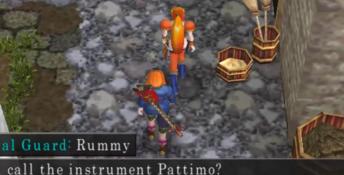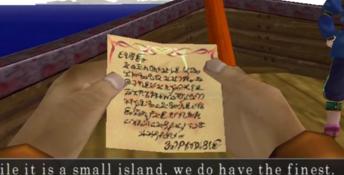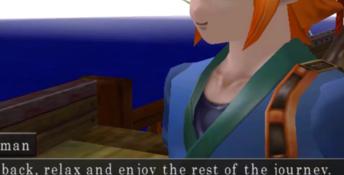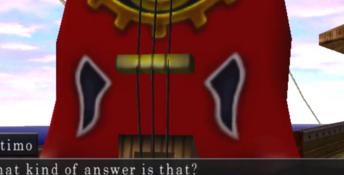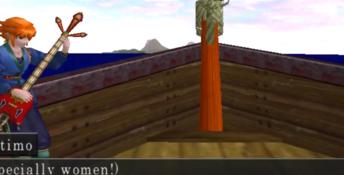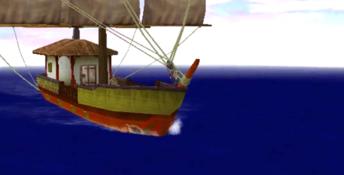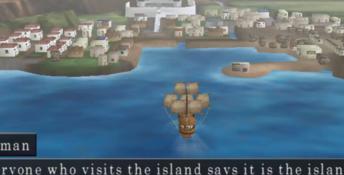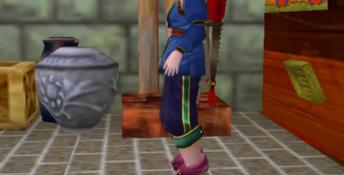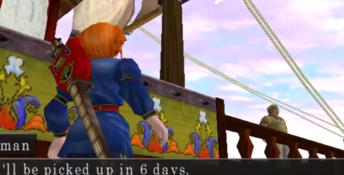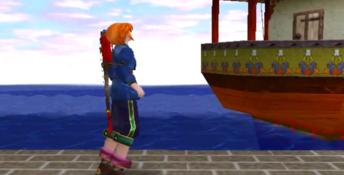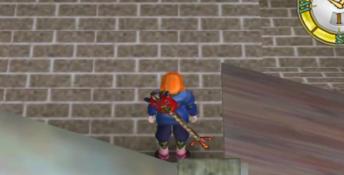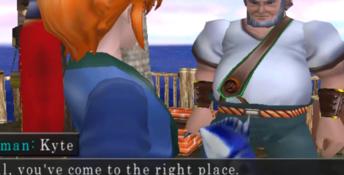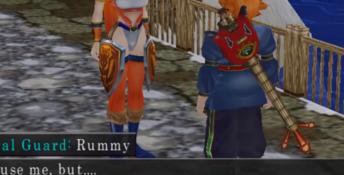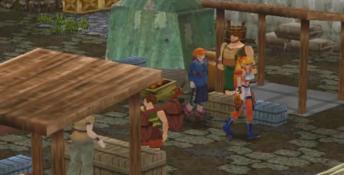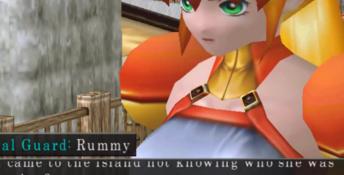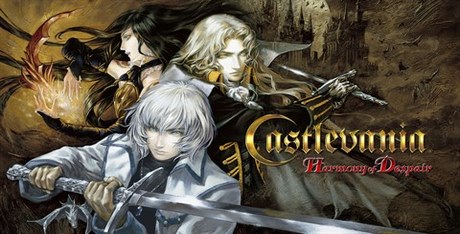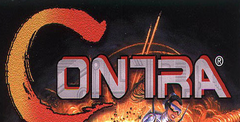Ephemeral Fantasia
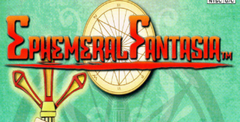
| a game by | Konami |
| Platform: | Playstation 2 |
| Editor Rating: | 6/10, based on 1 review |
| User Rating: | 7.0/10 - 4 votes |
| Rate this game: | |
| See also: | RPGs |
Overview
Mouse, a traveling musician and amateur thief, has been contacted to compose a song for Lord Xelpherpolis's wedding. Upon receiving this request, Mouse hardly hesitates at taking the opportunity and quickly sets off for the island. After all, Lord Xelpherpolis is the acting ruler of the small island Pandule and is probably quite wealthy. Who would even notice if a few valuable trinkets came up missing with all the wedding events and activities going on?
When Mouse arrives on the island, he is introduced to his guard Rummy and brought before the acting ruler of Pandule and the princess Loreille, the sole inheritor to the royal line of Pandule. Once he formally accepts the task, he sets off to compose the song using Pattimo, a living instrument and traveling companion to Mouse. There is definitely something peculiar about his new employer however, and the princess seems very downtrodden and cold during what should be the happiest time of her life. Something else seems mysterious too, as no one ever wants to leave Pandule once they arrive. Well, all this is of no concern to Mouse as he's there to compose a song and maybe get a five-finger discount when convenient. Or is it?
Ephemeral Fantasia is a role-playing game where you take Mouse and other characters through the island of Pandule, trying to discover why nobody ever leaves and the cause of the princess's solemn demeanor. In addition, you'll be introduced to over 160 types of monsters and an original battlefield layout. That about sums up its redeeming qualities. Unfortunately, as you'll see, most of the rest of the game is either inadequate or barely meets any sort of standard.
Gameplay, Controls, Interface
Once the game is started, a short intro will begin with Mouse on a ship headed toward the island of Pandule. As Mouse starts talking to the captain and to his instrument, Pattimo, you'll notice that there seems to be something missing. That thing turns out to be an interesting issue involving the intro and general gameplay. It appears that instead of converting the dialogue into different languages, shortcuts where taken during development, and when the characters are supposed to speak, there are no voiceovers. Not to fear however, as the words are in a text box at the bottom of the screen, but you'd better be a speed-reader if you want to catch them all. After attempting to read the intro, you will follow Mouse as he lands on Pandule and a royal guard finds and escorts him to the inn where he will be staying. As the guard departs, she informs you that Xelpherpolis isn't ready to see you yet and to have a look around the city.
As you start to look around, you'll notice that time is passing, since one of the selling points that the game brags about is that it's real time. There are clocks throughout the town that show the time, as night and day cycles affect the game. The real problem with the way this concept was implemented is that if you finish some phase early, you have to wait until time catches up for the game to progress. This can be extremely annoying as time has to basically be killed doing useless tasks just to start the gameplay moving again. To make matters worse, there are load times constantly throughout the game. They can last around three or four seconds, which isn't a big deal, but the large quantity really slows things down.
Another issue you'll see is that the physics of the game, well, defy physics. For instance, when walking into a wall or solid object, Mouse will keep going instead of stopping. When close up or during a cut-scene, the characters seem to glide across the ground, and objects that are moved such as doors or windows fail to give any sense of weight or the force required to move them. Generally, what you see is a game that functions physically like it was on a console one or two generations back.
One part of the game that is different is the battlefield. Once Mouse leaves the city, he'll run into enemies and fight them using a unique battlefield structure. When an enemy is found, a screen is pulled up with Mouse and his companions in one of four placements. Depending on where you are, either the center or perimeter A, B, or C, you'll notice it greatly affects how you attack and defend against your opponents. For instance, if you find yourself in the center, it becomes harder to run away as you can be attacked from all sides with the whole party suffering damage. It also affects what you use in your attack as certain spells work better on smaller areas and some work better on larger ones. The other interesting issue is that, again, it's in real time. If you start thinking about your next move, often you've already been hit at least once, creating a need to rush through each battle as fast as possible which makes it difficult to enjoy. You can, however, make it automatic, letting the AI take over but this basically makes you a spectator and isn't very thrilling.
How do the controls handle, you might ask? Well, I wish there was something better to report, but generally they were lacking also. The controls consist mainly of giving the player a greater ability to change the camera angle. This is done primarily with the triangle button, as it alone gives three different views: normal, close, and far away. In addition, you can spin the camera left and right by using the L1 and R1 buttons. That to me is a lot of unnecessary camera angles to look at meager graphics -- the angles don't add anything to the game and are mostly useless. The other buttons perform useful functions such as speak, search and run but nothing exciting. You'll also notice that during a battle the controls are different, but the time issue becomes relevant here as it takes time to select which character to control and what attack you want them to perform.
Graphics
The graphics would have been great if this was a Nintendo 64. They really dropped the ball here and I find it frustrating to have a game created with such a poor graphical representation on a system like the PlayStation 2. Often the characters' noses would disappear when looking at them straight on, while for some reason their collarbones would be clearly defined. This doesn't make any sense, especially when combined with the various other examples, such as their ears looking like they were cut out with scissors, or the water on a beach shore moving in straight lines. What really takes the cake is when the characters themselves are disproportioned. You'll see characters with abnormally short arms, really long legs, or generally not looking quite right.
Audio
The audio, however, was respectable with the exception of a lack of voiceovers for the characters. I've found that a character's voice really helps define his or her personality and to leave it out makes it more difficult to become immersed in the game. The interesting thing is that while the characters are 'talking'? other sounds can be heard, which generates a feeling that something is missing or left out. Those other sounds in the game are adequate -- you can hear footsteps or a guitar hitting the floor. The music tracks are also done fairly well. Overall, it seems half done and becomes a hefty distraction from the gameplay.
Bottom Line
Ephemeral Fantasia is far from the bull's eye concerning role-playing games on the PlayStation 2. Its inferior graphics and incomplete audio are a considerable distraction and the numerous gameplay issues cause problems of their own. If you're a role-playing fan and are looking for the next great title on the PlayStation 2, I'd keep looking. Its name really says it all as ephemeral actually means short lived or momentary and believe me, it is.
Download Ephemeral Fantasia

System requirements:
- PC compatible
- Operating systems: Windows 10/Windows 8/Windows 7/2000/Vista/WinXP
